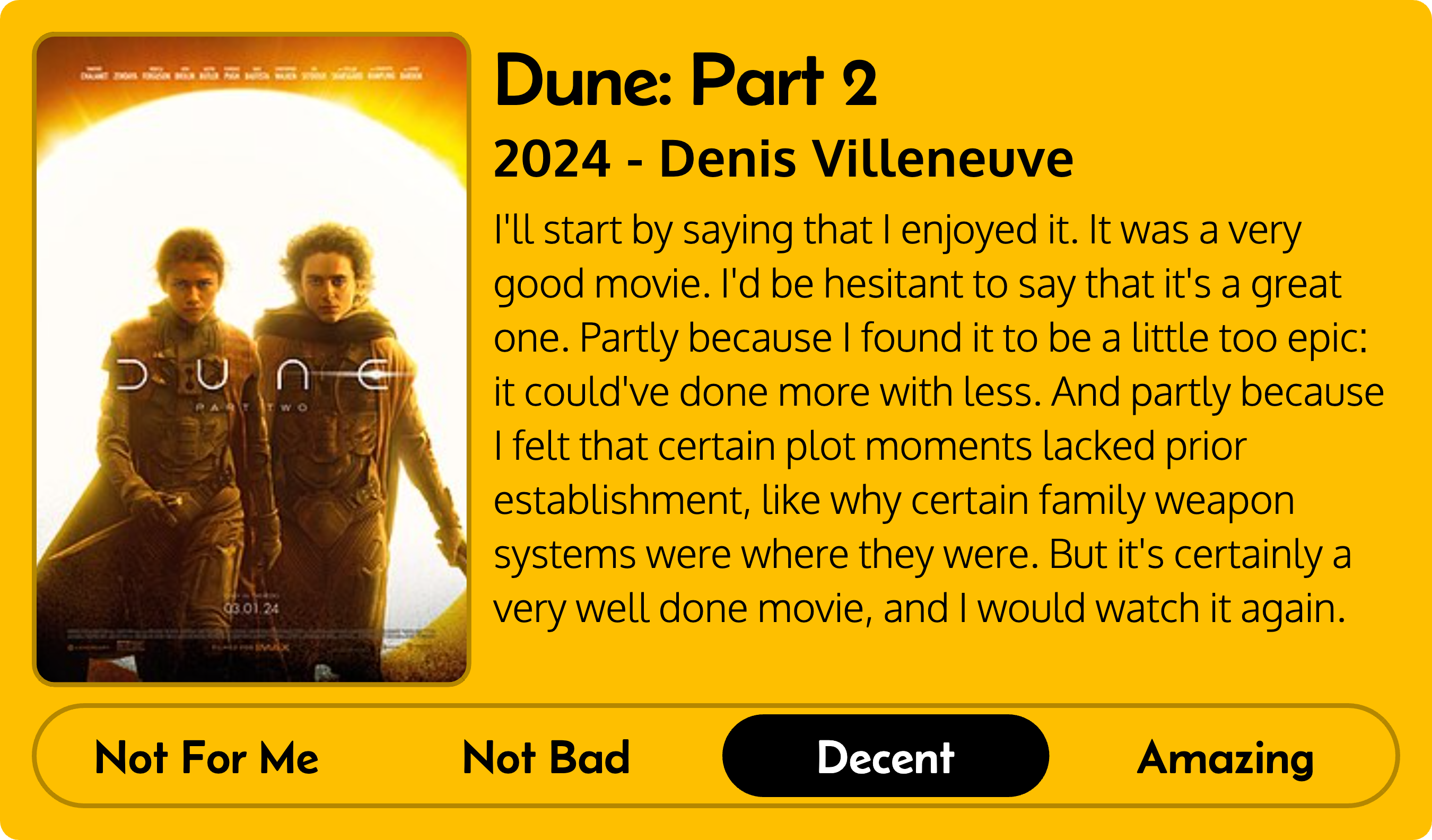-
Clip sharing is now available in Pocketcasts for Android! I was looking forward to this feature since I heard it was coming (this was why I was poking around About screens). Here’s my inaugural clip: a segment of Sharp Tech that I absolutely agree with. 🎙️
-
Weekly Update - 22 Sept 2024
No preface today. Let’s move on to the update. Cyber Burger Cyber Burger now has sound! I started added some basic sound effects to the laser and the items flying across the screen. They may change, depending on how I find them after a while, but it’s a start. I do like how Pico-8 makes these easy to make: select a waveform, then just draw out the pitch and volume graphically: Continue reading →
-
And that swoop-o-meter just keeps going up. We’re up to 4 noisy miners now. 👷♂️
-
Every problem at every company I’ve ever worked at eventually boils down to “please dear god can we just hire people who know how to write HTML and CSS.”
I know bugger all about the world of front-end web development. But seeing how quickly it takes me to get changes made and deployed using just these technologies, verses dealing with the mountain of JavaScript for an SPA, leaves me convinced that those that embrace HTML and CSS have a significant advantage over those that don’t.
-
I couldn’t for the life of me find out how to use HTMX with import maps. Importing it into a JavaScript module seems to activate all the HTML attributes just fine, but I had no access to the
htmxglobal, not even through thewindowobject. Hope support for this is added soon. -
Huh, that’s interesting. I just noticed that there’s an option to go to Automattic jobs page at the bottom of Pocketcast’s About screen. Nothing wrong with that. In fact, it may make for a good way to find developers. Who else would go to the About screen of mobile apps? 😄

-
📺 Dune: Part 2 (2024)

-
Micro-fiction: Get A Horse
Trying something new here. I came up with the concept of this short-story while riding home on the tram yesterday. The rest of it sort-of fell into place when I woke up at 5AM this morning, unable to get back to sleep. Hope you enjoy it. Josh was riding the scooter on the city footpath, not trying super hard to avoid the other pedestrians. He was going at a speed that was both unsafe and illegal, but it was the only speed he knew that would prevent that horse from showing up. Continue reading →
-
More Hemispheric Views #120 feedback: not that it happens often, but I too find it strange to be addressed as “sir”. I mean, I do appreciate the respect it imbues, but it adds an air of distance that I find slightly off-putting. Much rather be addressed as “mate.”
-
The whole segment on incorrect names on Hemispheric Views #120 was very enjoyable but this story from Scotty J. was the capper. I burst into laughter when I heard it. 🎙️
-
Ok #Fediverse let's have a bit of fun today!
How many of the things on the list have you done? Feel free to comment with any additional information as to which you've done or not done.
For me, I've done them all as I'm truly that old!

cliffwade @ allthingstech.social 6:18 PM • September 19, 2024 (UTC) Oof, how to feel old: I’ve done everything on this list, except for number 9, and only if you take the strict definition of “boombox” (I’ve listen to music on a radio with a cassette deck, for example). Oh, and I haven’t done number 19 either, but that’s because my parents had no interested in buying one. But I did have access to a encyclopaedia, so I think that’s close enough. Interestingly, the only time I ever sent a fax was in 2016.
-
There’s an old iMac in our office that has the dictionary screen-saver. You know the one with the blue background with words scrolling across the screen, then one pauses and the definition appears? Such a good screen-saver. Wish I had a reason to turn it on on my machines.
-
Slack has got a lot of work to do on their lists feature. It’s just feels horrible to use at the moment. It takes three clicks to select a cell, scroll events don’t work, and numerical fields are misaligned in edit mode. I can see this feature being useful. It just needs way more time in the oven.
-
There’s no such thing as a finite number of niches. People are doing, watching, and supporting interests that would’ve never crossed your mind. The internet is a really large place.
This epiphany came to me today as we were discussing, of all things, TikTok videos. I don’t use TikTok myself, but I work with people who do — or at least are more clued in to what goes on over there than I am1 — and it was quite eye-opening to hear what people would support.
-
Generally not a hard thing to do. ↩︎
-
-
What I would give to be riding on a Hitachi, with pull down windows, so that I can yell at some kids who thought trespassing on the railway line is a smart idea. 😠
It’s also just a fun train to ride in, especially in summer (I’m not kidding about this last point 🙂).
-
Forgotten how long it takes for AMIs to bake using Amazon Image Builder (up to 40 minutes). ⏳
-
The laundry gods were good to me. I was trepidatious about doing sheets today, what with the forecast being showers with a top of 14°C. Fortunately there was enough sunlight and a decent enough breeze to dry them before the showers arrive. I’ll sleep well tonight in a nice clean bed.
-
🔗 Private blogs on Scribbles
This excites me. One of the features that drew me to look at Scribbles was the possibility of private blogs. It’s great that this has been added now. I will definitely make use of it. Thanks, Vincent.
-
This new HTTP QUERY method looks interesting. It essentially boils down to a GET request with a body. I had been in circumstances, usually while coding up yet another search handler using POST, where I wish such a method existed. Would be interesting to see how widespread this is adopted.
-
A very chilly yet enjoyable bocce session at Calton Gardens today. Won one of the four games played, which is a good day for me.

-
Weekly Update - 15 Sept 2024
Two projects to discuss this week. Cyber Burger I’ve decided to ditch game mode A, where the player is given a series of stages they need to clear. Instead, I’m changing this to be closer to an old-school arcade experience. In this mode, you start the game with a 45 second timer, and you need get as high a score as you can before the timer runs out. Your score depends roughly on how large and “interesting” your burger is. Continue reading →
-
One of my regular walking trails go by a creek that runs along a small cliff. One day, I saw a group of people by the path pointing at and taking photos of something on that cliff. This is what they were looking at:


Since then I’ve been trying spot them, usually quite successfully.
-
I want to reach out to someone. A blogger that’s reasonably well known. Nothing special, just to say hello and thank you for something I’ve read of theirs recently. I’ve been thinking about it for a week now, deciding whether or not to go through with it. And after seeing a private post today from someone that been on the receiving end of such an outreach, I decided to go ahead with sending that email.
It’s almost like the fates were sending me their own message. If so, then I’m not sure how I should interpret the errors I’m getting from their email spam deferences on their contact page. Nevertheless, I think I’ll keep trying.
-
Anyone who wants to start a barber or hair styling place, here’s a name for you: Hair Today, Gone Tomorrow.
Or, if you’re an Aussie: There Is Hair In There (And A Chair As Well)
-
Real opinions from real people about a project management system which unfortunately is also real.
Love the tag line of this site. Also, spoilers, but Confluence makes a warranted appearance here as well.